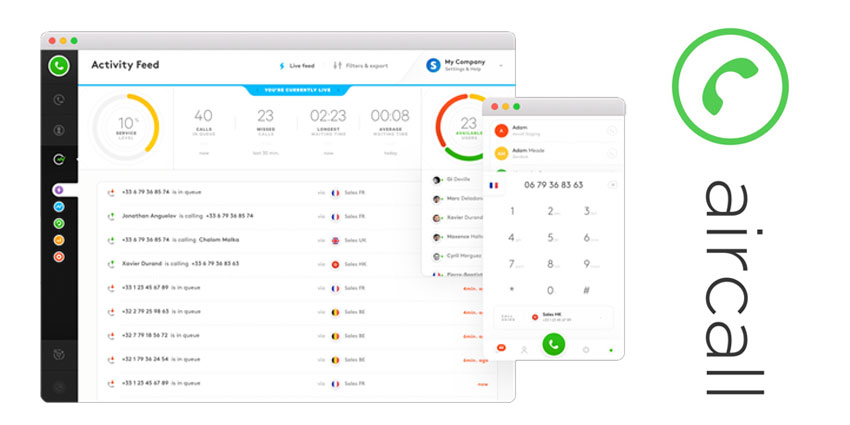The communication environment is definitely changing, with today’s customers searching for more diverse ways to connect with companies. One of the organisations helping to transform the contact centre marketplace today is Aircall, a business devoted to empowering support and sales teams with easy-to-access business tools.
Ever since the company first began in 2014, Aircall has been helping contact centre teams to make the most of every call with a system that’s specifically designed to integrate with any CRM platform the team might already be using. We caught up with the Co-founder and CEO of Aircall, Olivier Pailhes, to discuss how the Aircall solution came to life, and how it’s begun to grow astronomically in recent years.
Tell Us About Yourself and Aircall
Olivier wasn’t always the CEO of a leading cloud-based platform for call centre software. He went to business school and developed his knowledge of strategic consulting and backbone networks for a while, until he decided to launch his own company. His first business was actually in the construction industry, but he quit his job in 2013 to explore a digital approach to entrepreneurship instead.
“At the time, I was talking with an old friend of mine about the fact that voice communications weren’t being addressed in the way it should be. We decided we wanted to build a super-simple SaaS solution that was easy to set up, and perfect for empowering teams.”
Today, Aircall helps companies in search of digital transformation (DX) and evolution to embrace comprehensive tools for collaboration, reminders, and instant calendar access from the same simple platform.
Removing the Friction from Contact Centre Deployments
 At the time when Olivier was first setting up his business, the move to the cloud was already in full swing. It made sense for him to create a call strategy that was based on the cloud. After all, not only was it the technology of the future, but it served his aim to make the product an instant set-up and easy to access solution.
At the time when Olivier was first setting up his business, the move to the cloud was already in full swing. It made sense for him to create a call strategy that was based on the cloud. After all, not only was it the technology of the future, but it served his aim to make the product an instant set-up and easy to access solution.
“We didn’t want people to have to wait for IT to get things going. We wanted to remove that friction. Now you can add your numbers wherever you like, handle calls with mobile and desktop apps, and hit the ground running.”
“We can set our customers up within five minutes, and they can roll it out to their entire organisation and start seeing the results within a week. As we continue to add features now, we’re still focusing on keeping the system self-service oriented.”
Aircall offers a WebRTC solution that can turn anything into a phone system. That makes it much easier for people to integrate their smartphones into CRMs and other workplace tools. “Then you also get the availability of IT infrastructures like Twilio and Maximo”.
How Important is Integration for Aircall?

As well as making their solution as simple and accessible as possible, Aircall has also tried to ensure that their service is packed full of integration options too. This is a powerful decision to make in an incredibly competitive marketplace, where integrations can help to make almost any business stand out.
Olivier told me: “The overall vision for us is to add value to conversations. The way we think we can do that is to connect the data that companies have. That’s why we integrate with everything from Slack, to Desk.com, Zendesk, Zoho, and Salesforce. Whatever you’re working on, it all connects to Aircall so you can bring your entire system together. Today, we have more than a third of our revenue coming from those integrations.”
On top of that, Aircall is also available across 40 different countries, making it an ideal solution for those who want a global approach to the marketplace. There’s a free trial to get people started too so that you can try before you buy.
Why Did You Raise the Recent $29 Million Investment?
One of the biggest announcements for Aircall recently has revolved around their decision to raise $29 million in investment. I asked Oliver where the money they had earned would be going in the years ahead.
“We closed this round of funding with two main investors, one from Britain, and one from San Francisco. There are two main objectives for this particular investment. The first thing we want to do is improve our marketing and sales. We built a strong small-scale scales and marketing engine this year, and we want to scale that team up, and add more activities, more marketing with Salesforce and things like that.”
The other thing that Aircall are interested in doing is adding more investment into their product. “I think we’ve got a nice phone system foundation now, but we want to add more integration. We currently have 20 integrations, and we want to raise that to 100 by the end of next year. The aim is to help customers create sophisticated workflows for communication and collaboration.”
How Would You Describe Your Service?
I asked Pailhes how he would describe the Aircall service – whether he saw it as more of a contact centre solution or a collaboration platform.
“We see ourselves as a collaboration software, but we obviously move between phone systems and contact centre solutions. Our software is flexible, and we have integrations that help to empower the entire phone system.”
“The aim is to give people the value they would get from a full contact centre system, but available for a small to mid-sized enterprise. We want to be a way to upgrade the telephone system.”
The Aircall solution is very self-service. Olivier told me that many of their customers simply sign up to test the service and decide to continue using it as they go forward.
What Do You See in The Future?
Olivier noted that the future of the communication industry is particularly exciting, with new and disruptive technology emerging all the time. “There’s clearly interesting trends coming up around natural language processing and AI. These technologies are very young, but there’s a lot of people thinking about how they’re going to embrace them. I think the aim for us is to keep our eye on growth and helping to empower the call centre, without compromising on simplicity.”
I, for one, am excited to see where the journey leads next for Aircall.







